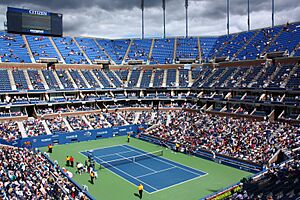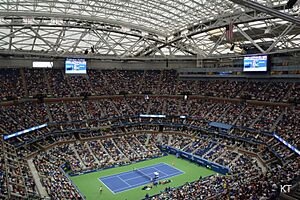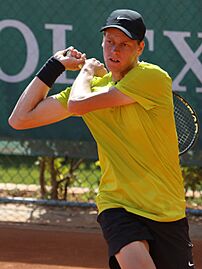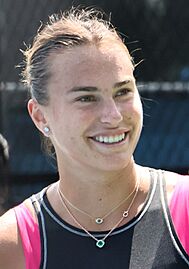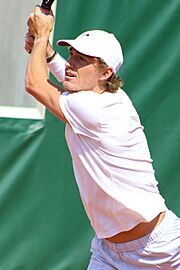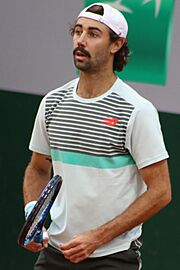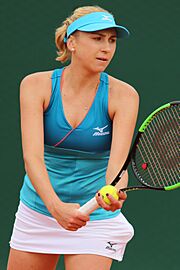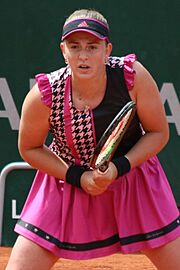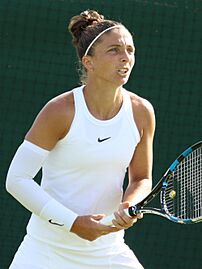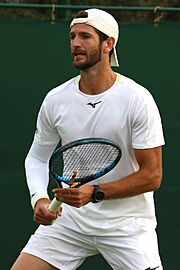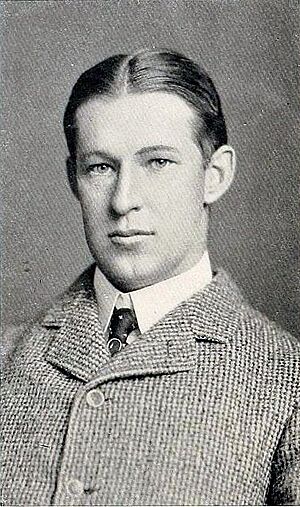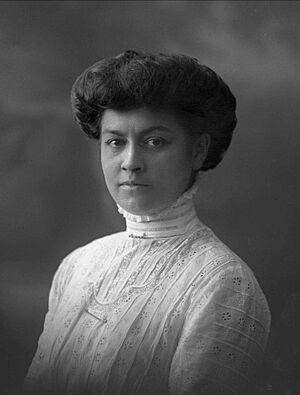US Open (tennis) facts for kids
 |
|
| Official website: http://www.usopen.org/home/default.sps | |
| Founded | 1881, 145 years ago |
|---|---|
| Editions | 144 (2024) 144 Grand Slam events |
| Location | Queens, New York City United States |
| Venue | USTA Billie Jean King National Tennis Center (since 1978) |
| Surface | Hard – outdoors (since 1978) Clay – outdoors (1975–1977) Grass – outdoors (1881–1974) |
| Prize money | US$75,000,000 (2024) |
| Men's | |
| Draw | S (128Q) / 64D (16Q) |
| Current champions | Jannik Sinner (singles) Max Purcell Jordan Thompson (doubles) |
| Most singles titles | 7 William Larned, Richard Sears, Bill Tilden |
| Most doubles titles | 6 Mike Bryan |
| Women's | |
| Draw | S (128Q) / 64D (16Q) |
| Current champions | Aryna Sabalenka (singles) Lyudmyla Kichenok Jeļena Ostapenko (doubles) |
| Most singles titles | 8 Molla Mallory |
| Most doubles titles | 13 Margaret Osborne duPont |
| Mixed doubles | |
| Draw | 16 |
| Current champions | Sara Errani Andrea Vavassori |
| Most titles (male) | 4 Bill Tilden Bill Talbert Bob Bryan |
| Most titles (female) | 9 Margaret Osborne duPont |
| Grand Slam | |
|
|
| Last completed | |
| 2024 US Open | |
The US Open Tennis Championships, often called the US Open, is a big tennis tournament. It is played on hardcourts in Queens, New York City, every year. This event is the fourth and final of the four major tennis tournaments, known as Grand Slams. The others are the Australian Open, French Open, and Wimbledon.
The US Open usually starts on the last Monday of August. It lasts for two weeks. Players must be at least 14 years old to join. Since 1968, both amateur and professional players have been able to compete.
This tournament is one of the oldest tennis championships in the world. It was first played in August 1881. The US Open is special because it was not stopped by World War I, World War II, or the COVID-19 pandemic in 2020.
The tournament has five main events: men's singles, women's singles, men's doubles, women's doubles, and mixed doubles. There are also events for senior players, junior players, and wheelchair players. Since 1978, the tournament has been held at the USTA Billie Jean King National Tennis Center in Queens, New York City. Money from tickets, sponsors, and TV helps grow tennis in the United States.
From 1971 to 2021, the US Open used standard tiebreakers in every set. Since 2022, a new rule was added for all four Grand Slams. If a match reaches 6-6 in the final set, an extended tiebreaker is played. This means players need to reach 10 points and win by two. This change helps make matches more consistent across all major tournaments.
Contents
History of the US Open
Early Years: Newport Casino (1881–1914)
The first US Open tournament was held in August 1881. It took place on grass courts at the Newport Casino in Newport, Rhode Island. Only clubs that were part of the United States National Lawn Tennis Association could enter. Richard Sears won the men's singles title that year. He went on to win seven titles in a row!
At first, only men competed in the U.S. National Championships. The first U.S. Women's National Singles Championship was held in 1887. It took place at the Philadelphia Cricket Club. A 17-year-old named Ellen Hansell won this first women's title.
Moving to Forest Hills (1915–1977)
In 1915, the tournament moved to the West Side Tennis Club in Forest Hills, Queens, New York City. Many players believed that New York City was a better place for the tournament. They thought it would help tennis grow. The men's singles tournament moved first. The women's tournament moved to Forest Hills in 1921.
In 1924, the International Lawn Tennis Federation officially called the US Open one of the world's major tournaments. In 1968, the "Open Era" began. This meant that professional tennis players could finally compete in the Grand Slam tournaments. Before this, only amateur players were allowed. The 1968 US Open was the first to allow professionals.
In 1970, the US Open was the first Grand Slam to use a tiebreaker when a set reached a 6-6 score. In 1973, it became the first Grand Slam to give equal prize money to men and women. The singles champions, John Newcombe and Margaret Court, each received $25,000. From 1975 to 1977, the tournament was played on clay courts instead of grass. This was an experiment to make it more exciting for TV. Also, lights were added so matches could be played at night.
New Home: USTA National Tennis Center (Since 1978)
In 1978, the tournament moved to a bigger, new place. This was the USTA National Tennis Center in Flushing Meadows, Queens. The court surface also changed from clay to hardcourt. Jimmy Connors is the only player to win US Open singles titles on all three surfaces: grass, clay, and hardcourt. Chris Evert is the only woman to win on two surfaces: clay and hardcourt.
The US Open is the only Grand Slam tournament that has been played every single year since it started.
In 2005, the US Open added wheelchair singles and doubles tournaments. In 2006, quad singles and doubles were added too. In 2006, the complex was renamed the "USTA Billie Jean King National Tennis Center." This was to honor Billie Jean King, a great tennis player and champion.
For several years, the men's final was played on Monday due to weather delays. In 2013 and 2014, the USTA planned for the men's final to be on Monday. This gave players more rest. In 2015, the US Open went back to having the women's and men's finals on Saturday and Sunday.
In 2018, the tournament started using a "shot clock." This clock helps make sure players don't take too long between points. It is visible to players, umpires, and fans. Now, all Grand Slams use this technology.
In 2020, the tournament was held without fans because of the COVID-19 pandemic. This was done to keep everyone safe.
Tournament Grounds
The US Open has 22 outdoor courts for matches. There are also 12 practice courts. The main courts are Arthur Ashe Stadium, Louis Armstrong Stadium, the Grandstand, and Court 17.
The biggest court is the Arthur Ashe Stadium. It can hold 23,771 people. A roof that can open and close was added in 2016. The stadium is named after Arthur Ashe, who won the first US Open in 1968. The next biggest court is the Louis Armstrong Stadium, which opened in 2018. It holds 14,061 people. The third largest is the Grandstand, with 8,125 seats.
All the courts at the US Open have lights. This means matches can be played in the evening, which is great for TV.
Court Surface
From 1978 to 2019, the US Open was played on a hardcourt surface called Pro DecoTurf. This surface is known for being medium-fast. Every August, before the tournament starts, the courts are resurfaced. In 2020, a new surface called Laykold became the official court supplier.
Since 2005, all US Open courts have been painted a special shade of blue inside the lines. This "US Open Blue" makes it easier to see the ball. The area outside the lines is still "US Open Green."
Line Call Challenges
In 2006, the US Open started using instant replay for line calls. This uses the Hawk-Eye computer system. It was the first Grand Slam to use this technology. This system was added after a controversial match in 2004 where some calls were incorrect.
At first, Hawk-Eye was only on the main courts. By 2018, all competition courts had it. Players were allowed three incorrect challenges per set. In 2021, player challenges were removed. The tournament now uses "Hawk-Eye Live," where all line calls are made electronically. This means a computer decides if the ball is in or out.
Points and Prize Money
Ranking Points
Players earn ranking points based on how far they go in the tournament. These points help them move up in the ATP (for men) and WTA (for women).
| Event | W | F | SF | QF | R4 | R3 | R2 | R1 | Q | Q3 | Q2 | Q1 |
| Men's singles | 2000 | 1300 | 800 | 400 | 200 | 100 | 50 | 10 | 30 | 16 | 8 | 0 |
|---|---|---|---|---|---|---|---|---|---|---|---|---|
| Men's doubles | 0 | — | — | — | — | — | ||||||
| Women's singles | 1300 | 780 | 430 | 240 | 130 | 70 | 10 | 40 | 30 | 20 | 2 | |
| Women's doubles | 10 | — | — | — | — | — |
Wheelchair Ranking Points
|
Junior Ranking Points
|
Prize Money
The total prize money for the 2025 US Open is $90 million. This is the largest prize money of all Grand Slams. It is also the biggest in the tournament's history.
| Event | W | F | SF | QF | Round of 16 | Round of 32 | Round of 64 | Round of 128 | Q3 | Q2 | Q1 |
| Singles | $5,000,000 | $2,500,000 | $1,260,000 | $660,000 | $400,000 | $237,000 | $154,000 | $110,000 | $57,200 | $41,800 | $27,500 |
|---|---|---|---|---|---|---|---|---|---|---|---|
| Doubles | $1,000,000 | $500,000 | $250,000 | $125,000 | $75,000 | $45,000 | $30,000 | N/A | N/A | N/A | N/A |
| Mixed doubles | $1,000,000 | $400,000 | $200,000 | $100,000 | $20,000 | N/A | N/A | N/A | N/A | N/A | N/A |
The prize money for singles players is the largest part. Doubles teams share their prize money. Wheelchair players also receive prize money and help with expenses.
In 2023, the total prize money reached $65 million. Players also received more help with expenses. This included travel vouchers and more money for hotel stays. Meal allowances and racquet stringing services were also improved.
Champions and Records
Recent Champions
Here are the champions from the 2024 US Open:
|
Most Recent Finals (2024)
| 2024 Event | Champion | Runner-up | Score |
|---|---|---|---|
| Men's singles | 6–3, 6–4, 7–5 | ||
| Women's singles | 7–5, 7–5 | ||
| Men's doubles | 6–4, 7–6(7–4) | ||
| Women's doubles | 6–4, 6–3 | ||
| Mixed doubles | 7–6(7–0), 7–5 |
Tournament Records
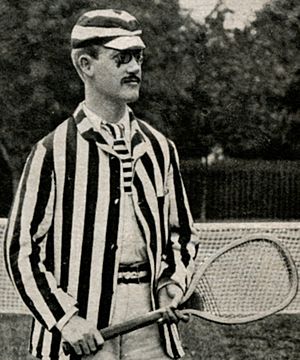
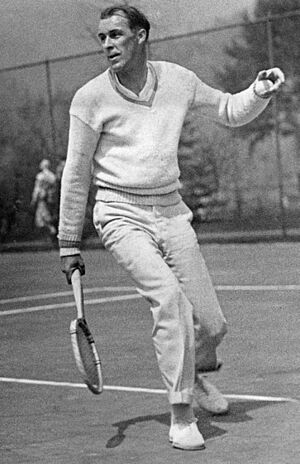
| Record | Era | Player(s) | Count | Years |
|---|---|---|---|---|
| Men since 1881 | ||||
| Most singles titles | Amateur Era | 7 | 1881–87 | |
| 1901–02, 1907–11 | ||||
| 1920–25, 1929 | ||||
| Open Era | 5 | 1974, 1976, 1978, 1982–83 | ||
| 1990, 1993, 1995–96, 2002 | ||||
| 2004–08 | ||||
| Most consecutive singles titles | Amateur Era | 7 | 1881–87 | |
| Open Era | 5 | 2004–08 | ||
| Most doubles titles | Amateur Era | 6 | 1882–84, 1886–87 with James Dwight 1885 with Joseph Clark |
|
| 1899–1901 with Dwight F. Davis 1904–06 with Beals Wright |
||||
| Open Era | 6 | 2005, 2008, 2010, 2012, 2014 with Bob Bryan 2018 with Jack Sock |
||
| Most consecutive doubles titles | Amateur Era | 7 | 1881–87 | |
| Open Era | 3 | 2021–23 | ||
| 2021–23 | ||||
| Most mixed doubles titles | Amateur Era | 4 | 1894–96 with Juliette Atkinson 1898 with Carrie Neely |
|
| 1907 with May Sayers 1909, 1911, 1915 with Hazel Hotchkiss Wightman |
||||
| 1913–14 with Mary Browne 1922–23 with Molla Mallory |
||||
| 1943–46 with Margaret Osborne duPont | ||||
| Open Era | 1966 with Donna Floyd 1967, 1971, 1973 with Billie Jean King |
|||
| 1969–70, 1972 with Margaret Court 1980 with Wendy Turnbull |
||||
| 2003 with Katarina Srebotnik 2004 with Vera Zvonareva 2006 with Martina Navratilova 2010 with Liezel Huber |
||||
| Most Championships (singles, doubles & mixed doubles) |
Amateur Era | 16 | 1913–29 (7 singles, 5 doubles, 4 mixed doubles) | |
| Open Era | 9 | 2003–14 (5 doubles, 4 mixed doubles) | ||
| Women since 1887 | ||||
| Most singles titles | Amateur Era | 8 | 1915–18, 1920–22, 1926 | |
| Open Era | 6 | 1975–78, 1980, 1982 | ||
| 1999, 2002, 2008, 2012–14 | ||||
| Most consecutive singles titles | Amateur Era | 4 | 1915–18 | |
| 1932–35 | ||||
| Open Era | 4 | 1975–78 | ||
| Most doubles titles | Amateur Era | 13 | 1941 with Sarah Palfrey Cooke 1942–50, 1955–57 with Louise Brough |
|
| Open Era | 9 | 1977 with Betty Stöve 1978, 1980 with Billie Jean King 1983–84, 1986–87 with Pam Shriver 1989 with Hana Mandlíková 1990 with Gigi Fernández |
||
| Most consecutive doubles titles | Amateur Era | 10 | 1941 with Sarah Palfrey Cooke 1942–50 with Louise Brough |
|
| Open Era | 3 | 2002–04 | ||
| 2002–04 | ||||
| Most mixed doubles titles | Amateur Era | 9 | 1943–46 with Bill Talbert 1950 with Ken McGregor 1956 with Ken Rosewall 1958–60 with Neale Fraser |
|
| Open Era | 3 | 1969–70, 1972 with Marty Riessen | ||
| 1971, 1973 with Owen Davidson 1976 with Phil Dent |
||||
| 1985 with Heinz Günthardt 1987 with Emilio Sánchez 2006 with Bob Bryan |
||||
| Most Championships (singles, doubles & mixed doubles) |
Amateur Era | 25 | 1941–60 (3 singles, 13 doubles, 9 mixed doubles) | |
| Open Era | 16 | 1977–2006 (4 singles, 9 doubles, 3 mixed doubles) | ||
| Miscellaneous | ||||
| Unseeded champions | Men | 1994 | ||
| Women | 2009 2017 2021 |
|||
| Youngest singles champion | Men | 19 years and 1 month (1990) | ||
| Women | 16 years and 8 months (1979) | |||
| Oldest singles champion | Men | 38 years and 8 months (1911) | ||
| Women | 42 years and 5 months (1926) | |||
Media and Attendance
Watching the US Open
The US Open website lets you watch live video of matches. It also offers live radio coverage.
In the United States, ESPN has been in charge of showing the tournament on TV since 2015. They use ESPN, ESPN2, and ABC channels. You can also watch matches from other courts on ESPN+.
Many other TV channels around the world show the US Open. For example, Eurosport covers it in Europe, and Prime Video and Sky Sports show it in the UK and Ireland.
How Many People Attend?
Many fans come to watch the US Open every year. Here are some recent attendance numbers:
See also
 In Spanish: Abierto de Estados Unidos para niños
In Spanish: Abierto de Estados Unidos para niños
 | Bessie Coleman |
 | Spann Watson |
 | Jill E. Brown |
 | Sherman W. White |


